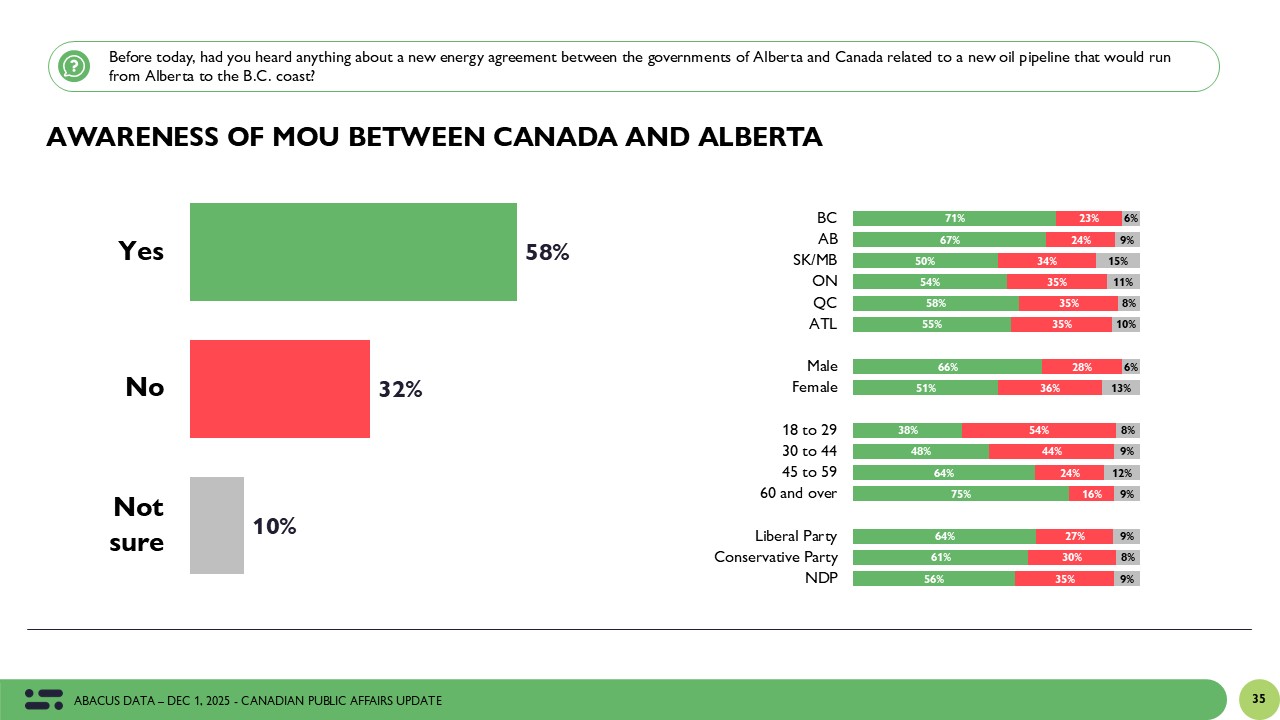Abacus Data Poll: Liberals and Conservatives Locked in Tight Race as Cost of Living Concerns Surge
October 5, 2025
Between September 26 and October 1, 2025, Abacus Data surveyed 1,504 Canadian adults on the state of federal politics. With Parliament back in session and economic anxieties simmering, this snapshot reveals a political landscape that is fiercely competitive and one where both major parties are digging in for a battle over economic credibility and leadership trust.
At the topline, little has shifted, but beneath the surface, rising pressure on affordability, mixed views of the Carney government, and some regional softness for both parties are shaping a dynamic fall political environment.
Direction of the Country: Still Static, Still Uneasy
The national mood remains stuck. Just 34% of Canadians believe the country is heading in the right direction, compared to 49% who say we’re on the wrong track, unchanged from mid-September but down from the recent peak at 40% in July.
Pessimism about the global context remains even more pronounced: only 13% believe the world is heading in the right direction, and just 14% feel that way about the United States.

Top Issues: Cost of Living Reasserts Itself
Affordability is back at the top and it’s gaining urgency. A full 62% of Canadians now cite the rising cost of living as one of their top three concerns, up 5 points in just two weeks.
Healthcare (35%) and the economy (35%) follow closely, while housing affordability remains a core concern at 34%, unchanged since mid-September.
Public concern over Donald Trump and his administration remains significant at 33% (although continuing its drop) while crime and public safety continues its slow climb, now at 21%, up 4 points over a month.

Government Approval: Slips Slightly but Holds Steady
Approval of Mark Carney’s government sits at 46%, down 4 points from two weeks ago, while disapproval has edged up to 31%, suggesting a modest softening in what had been steady approval over the past two months. The federal government’s approval is down 7-points since its peak in June.

Leader Impressions: Carney Leads, But Signals of Drift
Mark Carney continues to enjoy a modest favourability lead, with 48% of Canadians holding a positive view of him and 34% viewing him negatively, for a net favourability of +14.
But below those top-line numbers, a more complex picture is coming into focus and one that suggests voters are still working out who Carney is as a political leader and whether he’s lived up to the high expectations many had when he became Prime Minister.
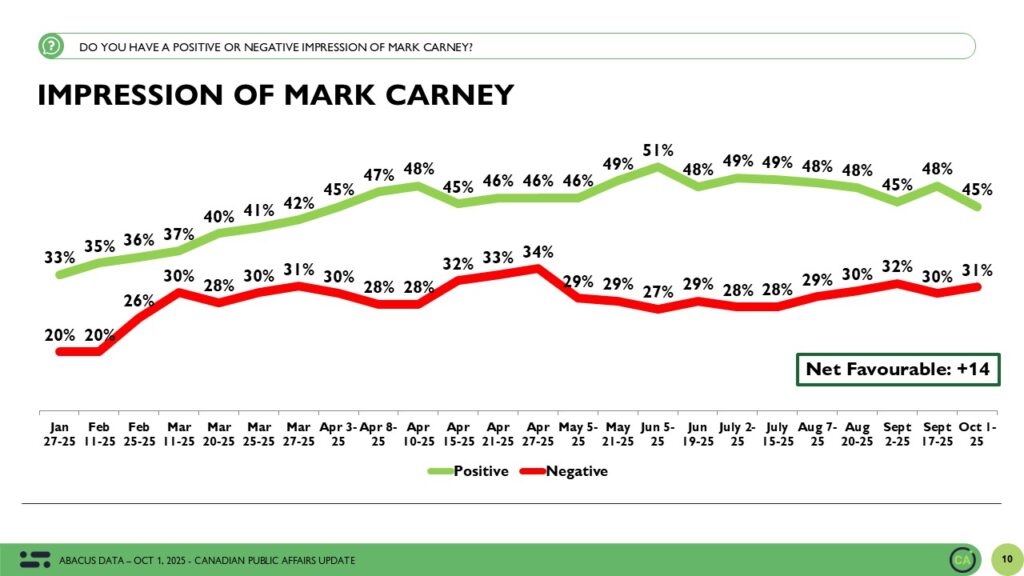
Only 40% of Canadians say Carney has lived up to their expectations. A nearly identical share (41%) say he’s done less than they expected, while 19% remain unsure.
Among 2025 Liberal voters, these numbers are more reassuring, but not overwhelmingly so. Just 63% say he’s lived up to expectations, while 21% say he’s underperformed, and 15% are unsure. That’s a solid majority, but it also means nearly 1 in 4 past Liberal voters aren’t sold yet.
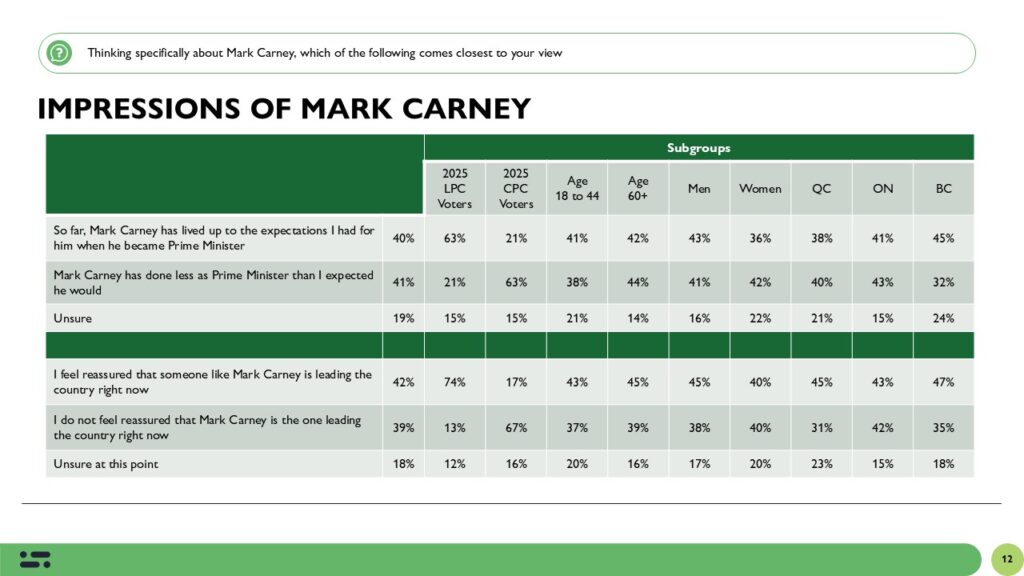
There are mixed views continues across other leadership metrics: 42% of Canadians say they feel reassured that someone like Carney is leading the country right now. But nearly as many (39%) do not feel reassured.
Once again, past Liberal voters are most confident, with 74% expressing reassurance — but even here, 1 in 5 either do not feel reassured (13%) or are unsure (12%).
And on whether Carney understands the challenges faced by people like them, Canadians are again divided: 38% say yes. 42% say no and 20% say they’re not sure.
Among past Liberal voters, 65% say Carney understands their concerns — but among younger voters (18–44), that number drops to 37%, and just 17% of Conservative voters agree. These gaps reveal the fragility of cross-partisan appeal that Carney once promised to offer.
Finally, Carney’s perceived decisiveness is also up for debate: 41% see him as strong and willing to make tough decisions. 38% disagree. And 21% are unsure.

Pierre Poilievre: Steady as he goes
Pierre Poilievre personal image is unchanged from two weeks ago. His favourability is narrowly negative at -2 (40% positive, 42% negative).

Carney vs. Trudeau: The Comparison Conservatives Want – and Carney Can’t Ignore
Since Mark Carney became Prime Minister, we’ve been tracking a key question: how different do Canadians think he is from Justin Trudeau? And just as important — does that difference (or lack of it) matter?
The Conservative Party has worked hard to tie Carney to Trudeau’s legacy, betting that the former PM’s baggage — especially on housing, affordability, and general political fatigue — still weighs heavily on many voters who ended up voting Liberal in April. And so far, that framing may be sticking, if only modestly.
In this wave, 55% of Canadians say Carney’s government is either very or fairly similar to Trudeau’s up just slightly from August. The percentage who believe the two governments are different (36%) has dipped a bit. So not a seismic shift, but in such a competitive political environment, every perception matters.

Where it gets more consequential is how these perceptions map onto vote intention. Among those who say Carney is like Trudeau and that’s a bad thing, a full 80% say they’d vote Conservative, while just 3% would back the Liberals.
By contrast, among those who see Carney as different from Trudeau and believe that’s a good thing, 71% say they’d vote Liberal. Being seen as unlike Trudeau is political advantageous at this moment.

The lesson here is pretty clear: being the anti-Trudeau matters — and not just symbolically. It’s a strategic imperative.
Issue Ownership: Conservatives Gain Edge on Core Issues
Among Canadians who prioritize affordability, the Conservatives lead by 13 points over the Liberals (41% to 28%). They also dominate on: crime and public safety (55% to 20%), immigration (62% to 17%), the economy (47% to 33%) and housing (36% to 26%).
The Liberals continue to hold advantages on: Trump and his administration (57% to 22%), healthcare (35% to 25%) and climate change (35% to 12%).

Accessible Voter Pools: Liberals Slightly Ahead
The Liberal Party remains accessible to 56% of voters nationally, compared to 53% for the Conservatives and 36% for the NDP.

Vote Intention: Conservatives +1, Liberals Hold Steady
If an election were held today: Conservatives 41% (+1), Liberals 40% (NC), NDP 7% (-1), BQ 7% (NC), Greens 3% (NC) and PPC: 2% (+1)
Among those certain to vote, the Liberals edge ahead with 43%, a 2-point lead over the Conservatives, suggesting turnout advantage might still matter.

Regional Spotlight
Ontario: Liberals lead 45% to 42%.
BC: Tie at 41% each.
Alberta: Conservatives dominate at 57%, Liberals at 25%.
Atlantic Canada: Liberals lead 47% to 41%.
Quebec: Liberals at 37%, BQ at 30%, Conservatives at 26%

Demographic Trends: Gender Gap Returns, Education Still Divides
The gender gap is modest but present: among men, Conservatives lead by 4 (44% to 40%), among women, Liberals lead by 3 (40% to 37%).
The education divide persists: University-educated go Liberal (48% to 36%) while those with college or apprenticeship go Conservative (44% to 36%).

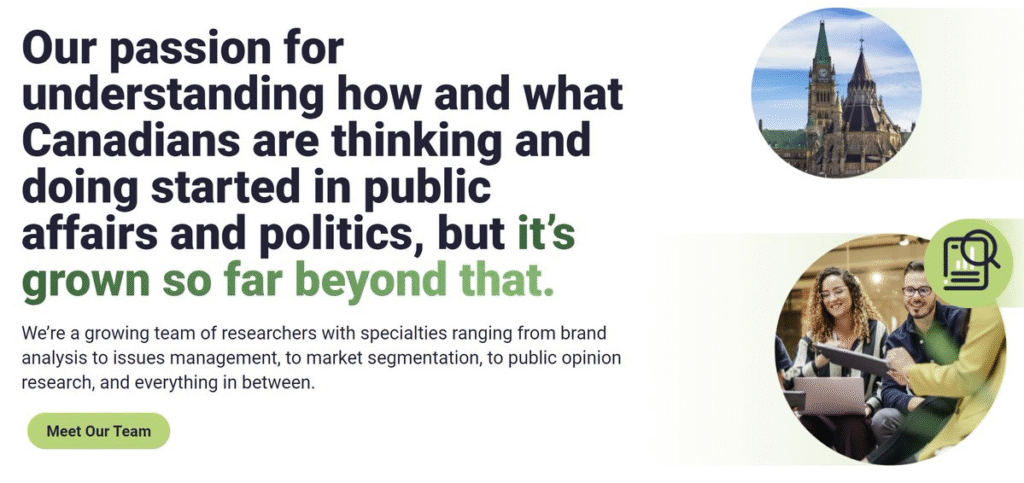
The Upshot
According to Abacus Data CEO David Coletto: ““This wave shows a political environment that remains sharply competitive, but where perceptions of leadership and contrast are becoming more important. Voters are anxious about affordability, skeptical about political promises, and still forming their impressions of Mark Carney as Prime Minister.”
While Carney’s overall numbers remain solid — favourables, approval, and vote share all holding steady — there are growing signs that impressions are starting to fragment. For many Canadians, he hasn’t yet delivered on expectations, and a sizable chunk still sees him through the lens of his predecessor.
And that comparison to Justin Trudeau may prove defining. Conservative efforts to tie Carney to Trudeau’s legacy appear to be resonating with a key subset of the public — particularly those frustrated with the past and eager for change. Among voters who see Carney as too similar to Trudeau and see that as a bad thing, nearly all are backing the Conservatives.
The lesson here is pretty clear: being the anti-Trudeau matters and not just symbolically. It’s a strategic imperative.
If Carney wants to shore up support and expand his coalition beyond the Liberal base, the best advice might be simple: wake up every morning, ask “What would Justin Trudeau do?” and then try to do the opposite.
With Parliament back in session and a precarious economic outlook ahead, the next few months could define whether Carney can firm up a distinctive political brand or is seen as a continuation of the past.”
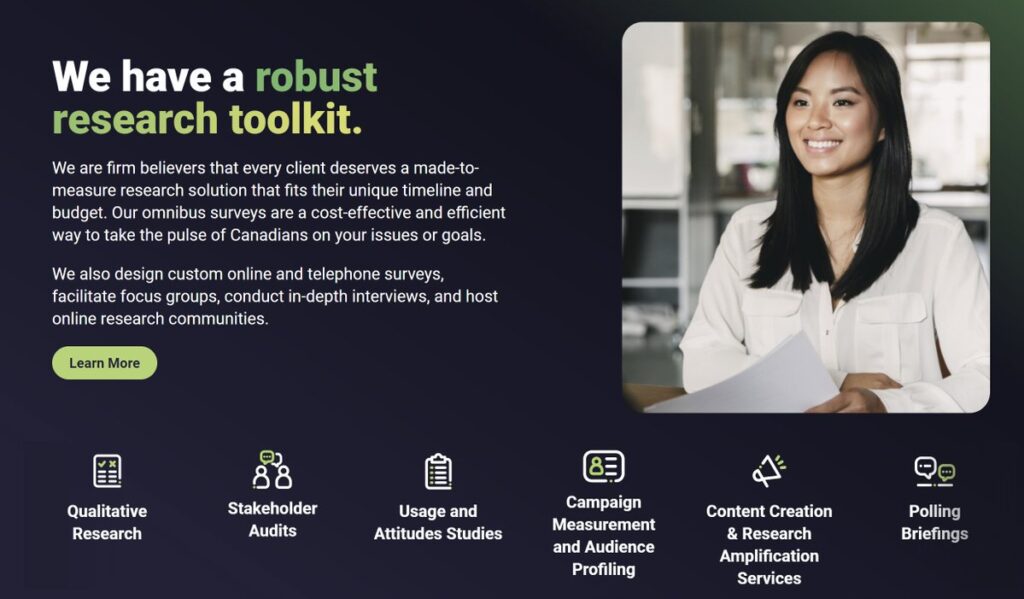
Methodology
The survey was conducted with 1,504 Canadians from September 28 to October 1, 2025. A random sample of panelists were invited to complete the survey from a set of partner panels based on the Lucid exchange platform. These partners are typically double opt-in survey panels, blended to manage out potential skews in the data from a single source.
The margin of error for a comparable probability-based random sample of the same size is +/- 2.5%, 19 times out of 20.
The data were weighted according to census data to ensure that the sample matched Canada’s population according to age, gender, and region. Totals may not add up to 100 due to rounding.
Abacus Data follows the CRIC Public Opinion Research Standards and Disclosure Requirements that can be found here: https://canadianresearchinsightscouncil.ca/standards/
The survey was paid for by Abacus Data Inc.
ABOUT ABACUS DATA
We are Canada’s most sought-after, influential, and impactful polling and market research firm. We are hired by many of North America’s most respected and influential brands and organizations.
We use the latest technology, sound science, and deep experience to generate top-flight research-based advice to our clients. We offer global research capacity with a strong focus on customer service, attention to detail, and exceptional value.
And we are growing throughout all parts of Canada and the United States and have capacity for new clients who want high quality research insights with enlightened hospitality.
Our record speaks for itself: we were one of the most accurate pollsters conducting research during the 2025 Canadian election following up on our outstanding record in the 2021, 2019, 2015, and 2011 federal elections.
Contact us with any questions.
Find out more about how we can help your organization by downloading our corporate profile and service offering.


